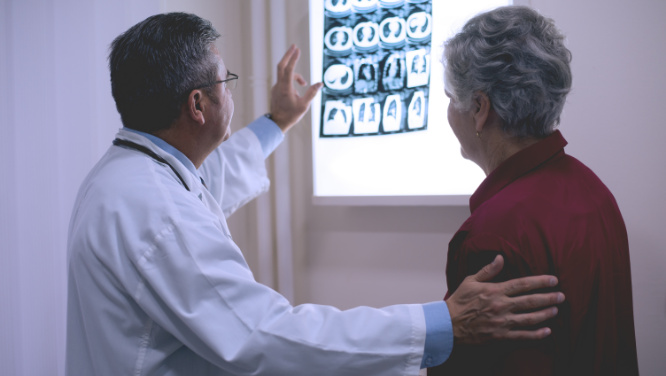Nuclear Medicine Department
Nuclear Medicine Department
Nuclear Medicine
At the Nuclear Medicine Department of Anadolu Medical Center, we research whether organs such as heart, kidneys, liver, thyroid, brain function normally or not, and whether there is cancer, infection or trauma in the bones or not.
Nuclear medicine tests provide significant contribution to imaging of diseases with minimal intervention to the human body. These tests provide guidance on detection of abnormalities in the function of an organ, and early diagnosis and treatment of very serious diseases. With these methods, medical problems can be diagnosed at an earlier stage than with any other diagnostic methods. Therefore diseases are under control early on, which improves the outcome of treatment.
Nuclear medicine methods are used to evaluate lymphatic metastasis of the disease in surgical treatment of some types of cancer like breast cancer and melanoma and for surgical planning as well.
At the Nuclear Medicine Department of Anadolu Medical Center, radioisotopes are used for the treatment of thyroid cancer and some rare types of cancer, and there are patient rooms specially designed for that purpose.
The procedures conducted in our nuclear medicine department are safe, efficient and painless. Prior to beginning the test, a drug containing a radioactive material is administered intravenously or orally. After a short time, special cameras take images of the body which are called “scintigraphy”. By observing the spread of this radioactive drug in the organ, crucial information is obtained for diagnosis. The images are evaluated by nuclear medicine specialists, and results are ready on the following day.
Fields of application in our Nuclear Medicine Department
In neurological diseases
- Diagnosis of paralysis (at an early stage)
- Diagnosis of Alzheimer’s Disease
- Evaluation prior to carotid artery surgery
- Determination of epileptic focus
- Determination of condition after head trauma
In oncological diseases
- Tumor location
- Tumor staging
- Location of metastases
- Assessment of treatment response
- Treatment of cancer related bone pain
In orthopedic diseases
- Determination of hidden bone injuries, sports injuries
- Diagnosis of bone inflammation (osteomyelitis)
- Diagnosis of joint diseases and determination of their spread
- Determination of biopsy location in tumors
- Determination of the spread of certain kinds of tumors
In renal diseases
- Diagnosis of urinary tract constriction
- Diagnosis of high blood pressure due to constriction of the kidney blood vessels
- Assessment of contribution of both kidneys to total function
- Evaluation of donor kidney
- Diagnosis of kidney infection (pyelonephritis)
- Diagnosis of kidney scars
In coronary diseases
- Diagnosis of coronary artery disease
- Assessment of bypass surgery efficiency
- Assessment of congestive heart failure treatment efficiency
- Assessment of donor heart
- Selecting patients for bypass or angioplasty
- Assessment of the cardiac risk of patients who are to undergo surgery for other reasons
- Diagnosis of right coronary insufficiency
- Monitoring the extent to which chemotherapy is harmful to the heart
- Quantitative assessment of shunts
- Diagnosis of infarcts prior to enzyme changes
In lung diseases
- Diagnosis of pulmonary embolism
- Assessment of donor lung
Other applications
- Diagnosis and treatment of hyperthyroidism (Graves Diseases)
- Diagnosis of gallbladder infection (Acute cholecystitis)
- Diagnosis of acute gastrointestinal bleeding
- Differential diagnosis of testicular diseases
- Identification of location of hidden infection
Technological equipments used in the Nuclear Medicine Department
PET / CT (in the diagnosis and treatment of all cancer types, in coronary and some cerebral diseases).
- Dual head SPECT camera
- Bone density measurement (DEXA)
- A “gamma probe” used in surgery
- Regional infection diagnosis with labeling of leukocytes at the laboratory
- Urea Breath Test and follow-up of H.pylori infection
Nuclear Medicine Department
Assoc. Prof. Kezban Berberoğlu
Videos
All videosPET-CT Hangi Hastalıklarda Kullanılır?
PET-CT Hangi Hastalıklarda Kullanılır?
Nükeer Tıp Bölümünün Kanser Tedavisindeki Yeri
Pet-CT Nedir?
Kanserde Akıllı Radyasyon Tedavileri Nedir? (Radyonüklid Tedaviler) - Doç. Dr. Kezban Berberoğlu - FOX TV
Pet-CT'nin Yararları

We listen to your opinions and suggestions to further enhance our service quality.

You can fill out the form to get a second doctor's opinion on the results of your tests, the diagnosis of your illness, and the treatment options we offer you.

You can receive the healthcare services you need at your home. Please fill out the form for home healthcare services.
Featured Articles
- 6 Nutrition Tips for Those Who Fast
- What is Disease X (Virus X)?
- How Does Cancer Form?
- What is an Ovarian Cyst?
- What is Cervical Cancer?
- What Are the Symptoms and Treatment Methods of Testicular Cancer?
- Symptoms, Diagnosis, and Treatment Process of Bladder Cancer
- Liver Cancer
- What is Stomach Cancer? What are Its Symptoms and Treatment?
- Thyroid: What is it, Symptoms, Diagnosis, and Treatment










